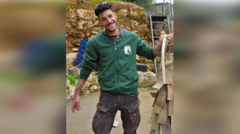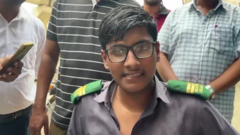An undercover BBC Africa Eye investigation sheds light on the exploitation of minors in Maai Mahiu, Kenya. It uncovers disturbing testimonies from children involved in prostitution, the complicity of adults known as "madams," and the systemic failures that allow these heinous acts to continue without prosecution.**
Exposing the Dark Underbelly of Kenya’s Child Prostitution Rings**

Exposing the Dark Underbelly of Kenya’s Child Prostitution Rings**
A shocking investigation reveals the involvement of "madams" in the exploitation of children within Kenya's sex trade, highlighting the urgent need for intervention.**
In a chilling exposé, a BBC Africa Eye investigation has unveiled the disturbing reality of child prostitution in Maai Mahiu, Kenya, a bustling transit town notorious for its sex trade activities. Through undercover operations, journalists discovered that women referred to as "madams" are deeply entrenched in the exploitation of children as young as 13, coercing them into prostitution to serve truck drivers and other clients who frequent the area.
Maai Mahiu, located just a short distance from Nairobi, serves as a critical transport hub linking Kenya with neighboring countries such as Uganda and Rwanda. This commercial activity has inadvertently fostered a climate where child sexual abuse is alarmingly normalized. Discussing their methodology, investigators revealed they posed as aspiring sex workers with the intent to learn how to operate as madams. This approach allowed them to gather compelling evidence of the illegal operations taking place.
Among those implicated is a woman named Nyambura, who openly declared her manipulation of vulnerable minors by luring them with sweets, further highlighting the systemic abuse present in Maai Mahiu. In the undercover footage, she described how the town’s sex trade is a lucrative industry, driven primarily by truckers. Acknowledging the risks of exploiting minors, she recounted using caution to hide the girls during the day, exposing them only under the cover of darkness.
Despite presenting documentation of these abuses to Kenyan authorities back in March, no arrests have been made, and the madams have reportedly evaded capture. This failure to act is compounded by a lack of conviction rates in the country, primarily due to the unwillingness of minors to testify against their abusers.
Nyambura's confessions continued as she revealed the extent of abuse suffered by the girls, who are often subjected to horrific experiences. Some even reported being forced to have sex with multiple clients daily, with one girl lamenting, “I have to [have sex without a condom]. I will be chased away, and I have nowhere to run to. I am an orphan."
The investigation also highlighted, through the testimony of another madam named Cheptoo, the financial incentives behind such exploitation. By selling minors, she claimed to be able to provide a better life for herself, framing her actions as a means of economic survival. Cheptoo’s chilling conversations with the undercover investigator showcased how deeply entrenched these operations are in the societal fabric of Maai Mahiu.
With no reliable statistics available on the scale of child prostitution within Kenya, previous estimates suggested the presence of roughly 30,000 minors engaged in sex work. Nonetheless, new research by various NGOs continues to unveil alarming trends, with many children being drawn into this traumatic lifestyle, often escaping dire circumstances only to face further victimization.
In a desperate attempt to fight back, a former sex worker, known simply as "Baby Girl," has taken it upon herself to provide refuge for girls who have escaped such brutalities. She offers shelter, skills training, and a chance for recovery to those traumatized by their experiences. The heartbreaking stories of children like Michelle and Lilian illustrate the cycle of abuse that feeds into this illicit industry, where young girls are trapped in a web of violence and neglect, often from a young age.
Despite the ongoing crisis, support systems like Baby Girl's outreach initiatives are now under threat due to recent USAID funding cuts, prompting fears over the future of vulnerable minors in the region. As these programs face closure, advocates continue to urge the government and international bodies to take action against the rampant child sexual abuse obscured in the shadows of Kenya’s sex trade.
While investigations like BBC Africa Eye’s continue to uncover the truth, the story of these children demands greater attention and immediate reforms to protect the most vulnerable in society from exploitation.
Maai Mahiu, located just a short distance from Nairobi, serves as a critical transport hub linking Kenya with neighboring countries such as Uganda and Rwanda. This commercial activity has inadvertently fostered a climate where child sexual abuse is alarmingly normalized. Discussing their methodology, investigators revealed they posed as aspiring sex workers with the intent to learn how to operate as madams. This approach allowed them to gather compelling evidence of the illegal operations taking place.
Among those implicated is a woman named Nyambura, who openly declared her manipulation of vulnerable minors by luring them with sweets, further highlighting the systemic abuse present in Maai Mahiu. In the undercover footage, she described how the town’s sex trade is a lucrative industry, driven primarily by truckers. Acknowledging the risks of exploiting minors, she recounted using caution to hide the girls during the day, exposing them only under the cover of darkness.
Despite presenting documentation of these abuses to Kenyan authorities back in March, no arrests have been made, and the madams have reportedly evaded capture. This failure to act is compounded by a lack of conviction rates in the country, primarily due to the unwillingness of minors to testify against their abusers.
Nyambura's confessions continued as she revealed the extent of abuse suffered by the girls, who are often subjected to horrific experiences. Some even reported being forced to have sex with multiple clients daily, with one girl lamenting, “I have to [have sex without a condom]. I will be chased away, and I have nowhere to run to. I am an orphan."
The investigation also highlighted, through the testimony of another madam named Cheptoo, the financial incentives behind such exploitation. By selling minors, she claimed to be able to provide a better life for herself, framing her actions as a means of economic survival. Cheptoo’s chilling conversations with the undercover investigator showcased how deeply entrenched these operations are in the societal fabric of Maai Mahiu.
With no reliable statistics available on the scale of child prostitution within Kenya, previous estimates suggested the presence of roughly 30,000 minors engaged in sex work. Nonetheless, new research by various NGOs continues to unveil alarming trends, with many children being drawn into this traumatic lifestyle, often escaping dire circumstances only to face further victimization.
In a desperate attempt to fight back, a former sex worker, known simply as "Baby Girl," has taken it upon herself to provide refuge for girls who have escaped such brutalities. She offers shelter, skills training, and a chance for recovery to those traumatized by their experiences. The heartbreaking stories of children like Michelle and Lilian illustrate the cycle of abuse that feeds into this illicit industry, where young girls are trapped in a web of violence and neglect, often from a young age.
Despite the ongoing crisis, support systems like Baby Girl's outreach initiatives are now under threat due to recent USAID funding cuts, prompting fears over the future of vulnerable minors in the region. As these programs face closure, advocates continue to urge the government and international bodies to take action against the rampant child sexual abuse obscured in the shadows of Kenya’s sex trade.
While investigations like BBC Africa Eye’s continue to uncover the truth, the story of these children demands greater attention and immediate reforms to protect the most vulnerable in society from exploitation.





















